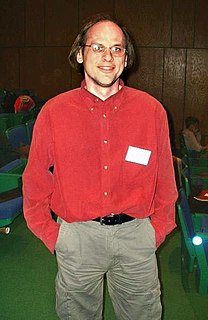A Quote by Freeman Dyson
I'm a mathematician, basically. What I do is look around for problems where I can find useful applications for mathematics. All I do, really, is the math, and other people have the ideas.
Quote Topics
Related Quotes
I don't think that everyone should become a mathematician, but I do believe that many students don't give mathematics a real chance. I did poorly in math for a couple of years in middle school; I was just not interested in thinking about it. I can see that without being excited mathematics can look pointless and cold. The beauty of mathematics only shows itself to more patient followers.
If you ask ... the man in the street ... the human significance of mathematics, the answer of the world will be, that mathematics has given mankind a metrical and computatory art essential to the effective conduct of daily life, that mathematics admits of countless applications in engineering and the natural sciences, and finally that mathematics is a most excellent instrumentality for giving mental discipline... [A mathematician will add] that mathematics is the exact science, the science of exact thought or of rigorous thinking.
Mathematical thinking is not the same as doing mathematics - at least not as mathematics is typically presented in our school system. School math typically focuses on learning procedures to solve highly stereotyped problems. Professional mathematicians think a certain way to solve real problems, problems that can arise from the everyday world, or from science, or from within mathematics itself. The key to success in school math is to learn to think inside-the-box. In contrast, a key feature of mathematical thinking is thinking outside-the-box - a valuable ability in today's world.
When the world is mad, a mathematician may find in mathematics an incomparable anodyne. For mathematics is, of all the arts and sciences, the most austere and the most remote, and a mathematician should be of all men the one who can most easily take refuge where, as Bertrand Russell says, "one at least of our nobler impulses can best escape from the dreary exile of the actual world."
It is a melancholy experience for a professional mathematician to find himself writing about mathematics. The function of a mathematician is to do something, to prove new theorems, to add to mathematics, and not to talk about what he or other mathematicians have done. Statesmen despise publicists, painters despise art-critics, and physiologists, physicists, or mathematicians have usually similar feelings: there is no scorn more profound, or on the whole more justifiable, than that of the men who make for the men who explain. Exposition, criticism, appreciation, is work for second-rate minds.
I don't want to convince you that mathematics is useful. It is, but utility is not the only criterion for value to humanity. Above all, I want to convince you that mathematics is beautiful, surprising, enjoyable, and interesting. In fact, mathematics is the closest that we humans get to true magic. How else to describe the patterns in our heads that - by some mysterious agency - capture patterns of the universe around us? Mathematics connects ideas that otherwise seem totally unrelated, revealing deep similarities that subsequently show up in nature.
For most problems found in mathematics textbooks, mathematical reasoning is quite useful. But how often do people find textbook problems in real life? At work or in daily life, factors other than strict reasoning are often more important. Sometimes intuition and instinct provide better guides; sometimes computer simulations are more convenient or more reliable; sometimes rules of thumb or back-of-the-envelope estimates are all that is needed.
Mathematics is about problems, and problems must be made the focus of a student's mathematical life. Painful and creatively frustrating as it may be, students and their teachers should at all times be engaged in the process - having ideas, not having ideas, discovering patterns, making conjectures, constructing examples and counterexamples, devising arguments, and critiquing each other's work.
Mathematics can have its problems, but it's actually hasn't seen a lot of the problems as some of the other sciences and so much of it in what people are doing is completely useless. Nobody kind of in really cares very much. You don't really have kind of right and left and people in ideology coming in because there isn't any. It just doesn't actually connect up to the kinds of things that people ideologically worry about. So most of mathematics just doesn't tell you anything one way or another about global warming or about healthcare or about any number of things that you might care about.
My impression was and is that many programming languages and tools represent solutions looking for problems, and I was determined that my work should not fall into that category. Thus, I follow the literature on programming languages and the debates about programming languages primarily looking for ideas for solutions to problems my colleagues and I have encountered in real applications. Other programming languages constitute a mountain of ideas and inspiration-but it has to be mined carefully to avoid featurism and inconsistencies.




































